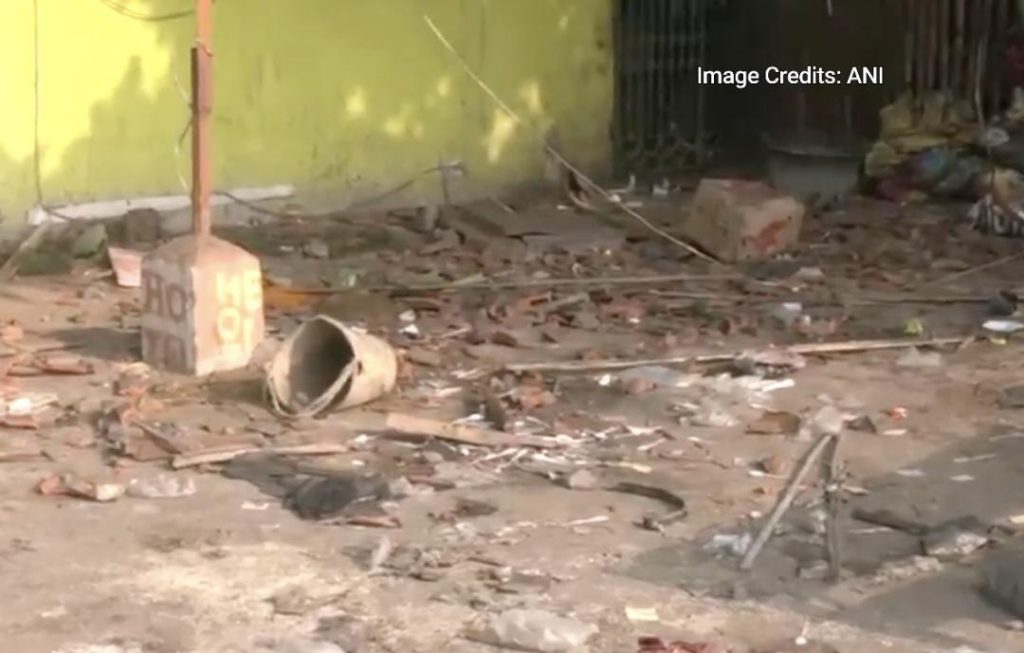
Title: 5,000 Disrupt Services & Pelt Stones at Bengal Railway Station During Protest Against Waqf Act
In a disturbing turn of events, nearly 5,000 people gathered at the Dhulianganga railway station in West Bengal on Friday, disrupting train services and pelting stones at the station. The protest was held against the Waqf Act, and the incident highlights the need for more effective measures to maintain law and order during such events.
According to reports, the Kamakhya-Puri Express was severely affected due to the disruption caused by the protesters. The mob gathered at the station after 1 pm and started pelted stones, destroying several things and disrupting the signal system. The situation was chaotic, with many passengers and railway officials caught in the midst of the protest.
The Eastern Railways released a statement confirming the incident, stating that the protest was held against the Waqf Act. The Act, which aims to manage and regulate the Waqf properties in the country, has been a topic of controversy in recent times. While some see it as a necessary measure to ensure the proper management of Waqf properties, others believe it to be an attempt to impose Islamic law on the country.
The protest at the Dhulianganga railway station was just one of the many incidents of violence and disruption reported in West Bengal on Friday. The state has been witnessing intense protests and demonstrations against the Waqf Act, with many groups and organizations coming together to voice their opposition to the legislation.
While the exact number of protesters involved in the incident at the Dhulianganga railway station is not known, reports suggest that it was in the thousands. The protesters were armed with stones and other objects, and they clashed with the police and railway officials. The situation was eventually brought under control, but not before significant damage had been caused to the railway station and the surrounding area.
The incident highlights the need for more effective measures to maintain law and order during protests and demonstrations. While the right to peaceful protest is an essential part of any democratic society, it is equally important to ensure that such protests do not disrupt the normal functioning of essential services like the railways.
In recent times, there have been several incidents of protests and demonstrations disrupting train services in India. While some of these incidents have been peaceful, others have turned violent, causing significant damage and disruption to the railways.
The Indian Railways is one of the largest employers in the country, and it plays a vital role in the country’s economy. The railways are also a vital mode of transportation for millions of people across the country, and any disruption to services can have significant consequences.
In order to prevent such incidents in the future, it is essential to ensure that protests and demonstrations are held in a peaceful and orderly manner. This can be achieved by providing adequate security to the protesters, and by ensuring that the police and railway officials are equipped to handle any situation that may arise.
The Waqf Act has been a contentious issue in West Bengal, with many groups and organizations opposing the legislation. While some see it as a necessary measure to ensure the proper management of Waqf properties, others believe it to be an attempt to impose Islamic law on the country.
The protest at the Dhulianganga railway station was just one of the many incidents of violence and disruption reported in West Bengal on Friday. The state has been witnessing intense protests and demonstrations against the Waqf Act, with many groups and organizations coming together to voice their opposition to the legislation.
In conclusion, the incident at the Dhulianganga railway station highlights the need for more effective measures to maintain law and order during protests and demonstrations. While the right to peaceful protest is an essential part of any democratic society, it is equally important to ensure that such protests do not disrupt the normal functioning of essential services like the railways.
It is essential for the government and law enforcement agencies to take immediate action to prevent such incidents in the future. This can be achieved by providing adequate security to the protesters, and by ensuring that the police and railway officials are equipped to handle any situation that may arise.
Sources:





